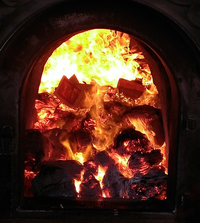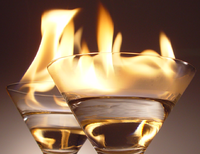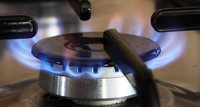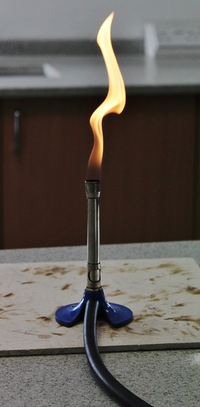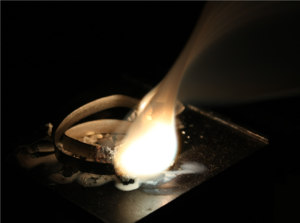Contents
Key Stage 2
Meaning
Burning is a chemical reaction that happens when something catches fire.
About Burning
- Materials can only burn if there is enough air.
- Substances cannot burn underwater or in empty space.
- Anything that burns is called a fuel.
Examples
| A solid fuel burning. | A liquid fuel burning. | A gas fuel burning. |
Note to Teachers
Students often don't recognise the difference between heating and burning. When asked what happens to a substance when it is heated they will say 'burn' when melting would be a more appropriate response. Students also do not always recognise the necessity of oxygen (or at least air) when things burn.
Key Stage 3
Meaning
Combustion is an exothermic reaction and a type of Oxidation reaction that happens when a fuel burns in the presence of oxygen releasing thermal energy and light.
About Combustion
- Combustion always happens at high temperatures and gives off light.
- Combustion may involve Hydrocarbons. This has the general equation: Fuel + Oxygen → Carbon Dioxide + Water
- Combustion may involve Metals. This has the general equation: Metal + Oxygen → Metal Oxide
Examples
Fuel + Oxygen → Carbon Dioxide + Water
- Methane + Oxygen → Carbon Dioxide + Water
- Ethane + Oxygen → Carbon Dioxide + Water
- Propane + Oxygen → Carbon Dioxide + Water
Metal + Oxygen → Metal Oxide
- Magnesium + Oxygen → Magnesium Oxide
- Aluminium + Oxygen → Aluminium Oxide
- Iron + Oxygen → Iron Oxide
| Methane + Oxygen → Carbon Dioxide + Water | Magnesium + Oxygen → Magnesium Oxide |
References
AQA
- Combustion, page 344, GCSE Biology; Student Book, Collins, AQA
- Combustion, pages 152-153, 158, 162-163, 202-203, GCSE Chemistry; Third Edition, Oxford University Press, AQA
- Combustion, pages 280-281, 290-291, GCSE Biology; Third Edition, Oxford University Press, AQA
- Combustion, pages 96, GCSE Combined Science Trilogy 2, Hodder, AQA
